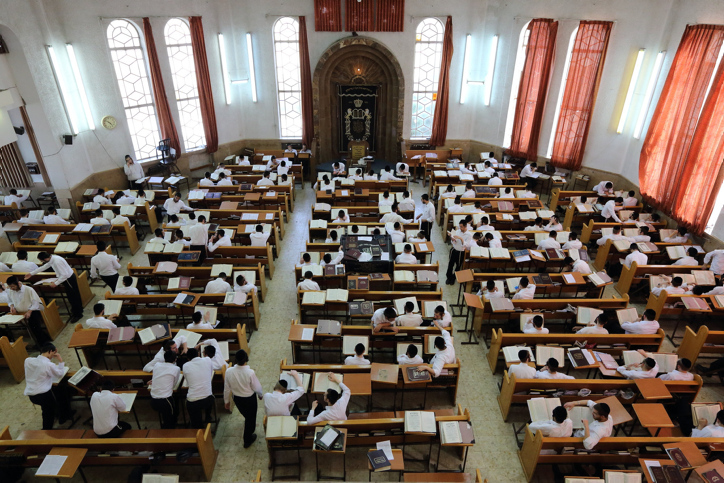Haredi faction threatens to oppose state budget if NIS 600 million demand not met
Agudat Yisrael, part of UTJ, says it wants more funding for full-time religious scholars and their families, in line with coalition deals; coalition official: ‘There’s a limit’

Part of Haredi party United Torah Judaism (UTJ) threatened Wednesday night to withhold its support for the crucial state budget, or even actively oppose it, unless the government further funds full-time religious scholars to the tune of NIS 600 million ($164 million), in addition to the billions already pledged to the ultra-Orthodox community.
Agudat Yisrael, which holds three of UTJ’s seven Knesset seats, released a statement late Wednesday night saying that it would not support the 2023-2024 state budget unless it received significant additional funding for men enrolled in full-time religious study, as well as their children.
The warning, which confirmed earlier reports, came days after the government approved NIS 13.7 billion ($3.7 billion) worth of discretionary funds to meet coalition commitments, largely to support ultra-Orthodox institutions and programs.
The Agudat Yisrael faction, which represents Hasidic ultra-Orthodox groups, held a meeting on Wednesday where it “was decided to uphold the agreement signed with the United Torah Judaism list, including the commitment to the budgets for the children of Torah scholars in the yeshivah and avrechi schools,” the statement read, in reference to full-time religious study schools.
Out of the approved NIS 13.7 billion in discretionary funds, about NIS 3.7 billion is promised to be spent on increasing the budget for stipends at Haredi yeshiva student institutions, despite criticism that the community’s schools skirt full Education Ministry oversight and fail to teach core subjects to prepare students for the workforce, including math, science and English. Another NIS 1.2 billion is budgeted for private, non-supervised educational institutions, which also do not teach core subjects such as math and English.
About NIS 1 billion is directed as an allowance for a food voucher program being pushed by Shas party leader Aryeh Deri. Additional funds will be funneled for ultra-Orthodox education, constructing religious buildings, and supporting Haredi Jewish culture and identity.
The government of Prime Minister Benjamin Netanyahu has less than two weeks to pass the proposed two-year, 2023-2024 trillion-shekel overall budget before its May 29 deadline, which if not met would trigger an automatic dissolution of parliament and snap elections.
Finance Minister Bezalel Smotrich has repeatedly said that the budget, which is expected to increase the national debt at a time when tax income is underperforming forecasts and inflation is rising, was swollen as a result of meeting political demands to keep Netanyahu’s hard-right coalition together.
UTJ is currently chaired by political newcomer and housing minister Yitzhak Goldknopf, who also controls Agudat Yisrael. The full party secured sweeping promises in their coalition deal with Netanyahu’s Likud, a non-binding agreement that often serves as a basis for future political deal-making.
“As you know, from time immemorial at the behest of the elders of Israel, this issue was the first in the coalition agreement and our only demand is the full implementation of the agreement,” Agudat Yisrael’s statement continued. “Loyalty and coalition commitment must be mutual.”

However, unnamed senior coalition officials told the Walla news site Wednesday that there was no intention of increasing the budget framework “by a single shekel,” lambasting the Haredi party for increasing its demands.
“There is a limit. It is ridiculous that they are not showing a shred of responsibility or patience,” the officials said. “The Haredi public has not seen such great achievements in the national budget since the state’s establishment, and it makes no sense that they are unable to understand that there are limits.”
Degel HaTorah, the second faction in UTJ, has yet to announce whether it is joining the protest and did not respond to a request for comment. While the 64-member coalition can still pass the budget without Agudat Yisrael’s three votes in the 120-member Knesset, this would not be the case if Degel HaTorah supports its partner and withholds its votes as well.
Goldknopf has sent a letter to Degel HaTorah leader Moshe Gafni, the Ynet news site reported Thursday, demanding that UTJ in its entirety oppose the state budget unless the additional funds are given.
According to a Tuesday report by public broadcaster Kan, lawmakers with Agudat Yisrael have also threatened to renew demands for a controversial law exempting Haredi community members from military service, which they dropped temporarily to see the budget through.
In recent weeks, Haredi Knesset members had leveraged the upcoming vote on the 2023-2024 state budget to push for progress on the military service exemption law, and criticized Netanyahu for failing to deliver.
The coalition agreement between UTJ and Likud includes an explicit pledge to approve such legislation before the budget is passed.
Agudat Yisrael’s threat puts more pressure on Netanyahu’s coalition at a sensitive time. With just 11 days left to shepherd the budget through its final two votes or risk snap elections, the government is working overtime to settle internal disputes.
On Wednesday, far-right Otzma Yehudit kicked its own budget protest into higher gear, sitting out three Knesset floor votes that let minor pieces of opposition legislation progress forward.
The party is demanding additional funds for its Negev and Galilee Ministry, demanding what a source close to its chief said was “equality” in funding Otzma Yehudit’s priorities, considering the large amount of funding devoted to ultra-Orthodox and other far-right party interests.
Also on Wednesday, protesters angry with the state budget gathered in the ultra-Orthodox enclave of Bnei Brak to rally against the generous funding of sectoral interests.
Ahead of the approval of the NIS 13.7 billion in funds on Sunday, the Finance Ministry warned that the promised money could lead to trillions of shekels in lost gross domestic product in the coming years.
The Finance Ministry’s Budgets Department head Yogev Gardos warned that the allocation of funds to ultra-Orthodox institutions and initiatives creates negative incentives for Haredi men to seek employment and will harm the country’s labor market and the economy as a whole.
Furthermore, Gardos cautioned that if the employment participation rate among Haredi men is not encouraged, by 2065 the government will have to increase direct taxes by 16 percent to maintain the same level of services that it provides without increasing the deficit.
Israel’s Haredi population, which makes up about 13.5% of the country’s total population, is expected to grow to 16% in 2030. The ultra-Orthodox population’s current growth rate of 4% is the fastest of any group in Israel, according to Central Bureau of Statistics data.
The Knesset is preparing to vote on the 2023-2024 overall budget, allocating NIS 484.8 billion this year and NIS 513.7 billion in 2024, up from NIS 452.5 billion in 2022.
As backdrop to it all, the coalition is also struggling with how to move forward with its controversial plan to overhaul the judiciary, which supporters call a necessary corrective but critics decry as potentially the end of Israel’s liberal democracy.
https://www.timesofisrael.com/haredi-faction-threatens-not-to-back-state-budget-if-nis-600-million-demand-not-met/?utm_source=The+Daily+Edition&utm_campaign=daily-edition-2023-05-18&utm_medium=email





